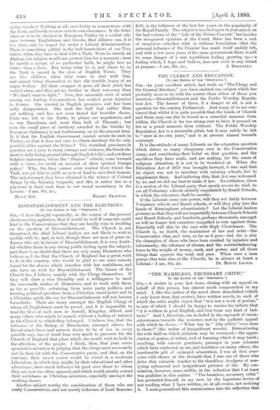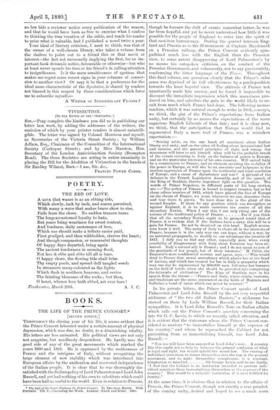"THE HARMLESS, NECESSARY CRITIC."
TO THE EDITOR OF THE "SPECTATOR.']
SIR, —A review in your last issue, closing with an appeal OD behalf of this person, has stirred much compunction in my- mind. I, like the author of the novel there demolished (which I only know from that review), have written novels, to each of which the critic might object that "it is not a work of genius,' to any of which I should be happy to receive his tribute that "it is written in good English, and free from any kind of bad- taste." And I, therefore, am included in the reproach of incon- siderateness towards the reviewer, met by the pathetic appeal with which he closes,—" What has he" (the critic) "ever done to them ?" (the writer of insignificent novels). Remembering the wide field on which criticism may be exercised,—the appre- ciation of genius, of talent, and of learning which it may teach ; recalling, with sincere gratitude, passages in your columns which have conferred on me, and doubtless on many others, the inestimable gift of enlarged admiration, I was at first over- come with shame at the thought that I was one of those who drive this valuable teacher to the thankless drudgery of ana- lysing ephemeral and insignificant pictures of life. My con- solation, however, came swiftly, in the reflection that I at least was guiltless in this matter. "The harmless, necessary critic' has protected himself, in my ease, by the ingenious device of not reading what I have written, or, at all events, not noticing it. I soon generalised this reminiscence into the reflection that
no law bids a reviewer notice every publication of the season, and that he would have been as free to exercise what I confess to thinking the true vocation of the critic, and teach his reader to prize what is valuable, had I published a novel twice a year.
Your ideal of literary criticism, I used to think, was that of the owner of a well-chosen library, who takes a volume from the shelves to point out to a friend this or that merit or interest—the last not necessarily implying the first, for an im- portant book demands notice, favourable or otherwise—but who at least never spends his time or his friend's in calling attention to insignificance. Is it the mere sensitiveness of egotism that makes me regret some recent signs in your columns of conver- sion to another view Or may it be that a preference for the ideal more characteristic of the Spectator, is shared by readers not biassed in this respect by those considerations which force me to subscribe myself,—
A WRITER OF INSIGNIFICANT FICTION?



































 Previous page
Previous page